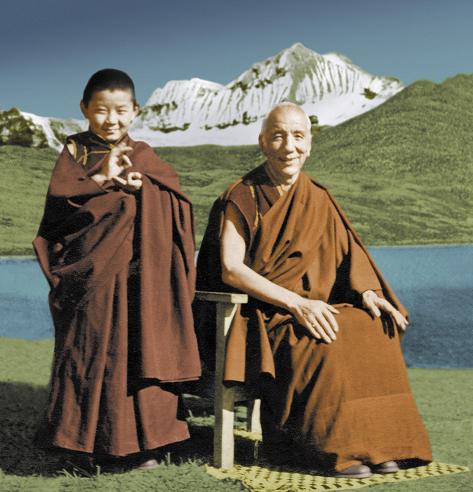
Sogyal Rinpoche recently returned to the Bhutan to offer his version of Tibetan Buddhism, which is the dominant religion in Bhutan. This interview appears in Kuensel Online, Bhutan's daily online news site.
To tame and transform the mindAn interview with Sogyal Rinpoche
16 May, 2010 - The last time you were in Bhutan, you mentioned that young people in the Himalayan region need to understand Buddhism in a more practical way. What can we do to make Buddhism more relevant, especially for younger generations today?
That’s why I’m actually coming here, to present teachings and to give the tools in a simple, practical and modern way. It’s hard to say, in just a few words, the main thing is to come to the teachings. What I want to do is, over the years, to give you the teachings stage by stage, especially this time I want to make it even more practical.
What role can Buddhism play in the context of a rapidly modernising or developing society? Wouldn’t the lifestyles we lead contradict our Buddhist background?
On the one hand, you can see there are big contradictions, however, if you really begin to study the teachings of Buddha, you will see his wisdom is amazing. It’s a matter of how you can transept. It requires very skillful translation of the teachings. Integration is a huge challenge but it’s possible. At the same time, of course, samsara and dharma don’t mix, as some masters say. Yet, at the same time, there is a way to integrate the dharma in our lives. I think it’s a good thing, it’s going slowly here in Bhutan at the moment, but I think it will require very skilful guidance, in terms of the youth. Also, the people must be a little bit patient with challenges.Buddhism embraces change, yet today in Bhutan we also believe and support the preservation of certain traditions. Some today wonder where we draw the line. What do we allow to change and what do we preserve?
There are some fundamental essential values and principles of the teachings of the dharma, which are timeless. But there are other things that can change according to geography or time like, for example, Tibetan Buddhism. It’s one thing in Tibet but another thing outside. It’s a different time; it can change. We must not all be stuck by the form, but for that change you also need lamas and scholars, who can understand the teachings well. To cut the story short, there are two kinds of traditions: one that’s fundamental to the teachings, which are timeless, which are not based on culture, on dogma, those traditions must be left to continue. Then there are others, which are only cultural paraphernalia; these can change.You also said the last time you were here, that Bhutan holds “extraordinary promise”. What role do you see Bhutan playing?
As Bhutan develops, as it meets modernity, there are so many areas it can contribute. For example, gross national happiness. An idea that has generated great interest in the world. Because there are two kinds of happiness: one based on material comfort and pleasures; the other on inner contentment and peace. And I think Bhutan can provide the latter, based on Buddhist principles. Material happiness is often very expensive and doesn’t satisfy us. Whereas, if it’s based on deeper inner peace and contentment, then even when you face difficulties, you can overcome them. Bhutan has a unique role to play, because it is the only independent Vajarayana country. In the future, Buddhism is going to have a real big impact; there’s going to be a greater impact. Bhutan can then develop these things and use them in a modern and practical way; it can enrich this impact.How do we achieve this inner peace and contentment?
Buddha said all fear and anxiety come from an untamed mind. If you were to ask what is the essence of the teachings of Buddha, it is to tame, to transform, to conquer this mind of ours, because it is the root of everything, it is the creator of happiness, of suffering, of samsara, of nirvana. So, if you know how to use the mind well, it can be the most wonderful thing. Or it can be your worst enemy as, I think, John Milton said, “The mind is its own place and, in itself, can make heaven of hell, and a hell of heaven.” The most important thing is to work with the mind, as great masters have said, it’s foolish to go looking for happiness outside, because you’ll have no control. When you transform your mind, your perception and experience transform, even appearances transform. Because happiness is not something that exists objectively, it’s subject to one’s experience. No matter what the circumstance are, you’ll be able to cope.By Gyalsten K Dorji
No comments:
Post a Comment